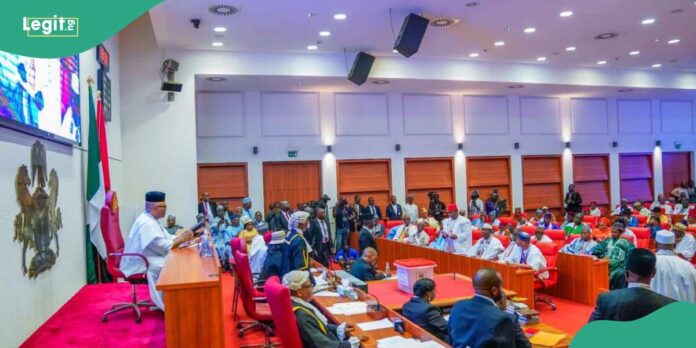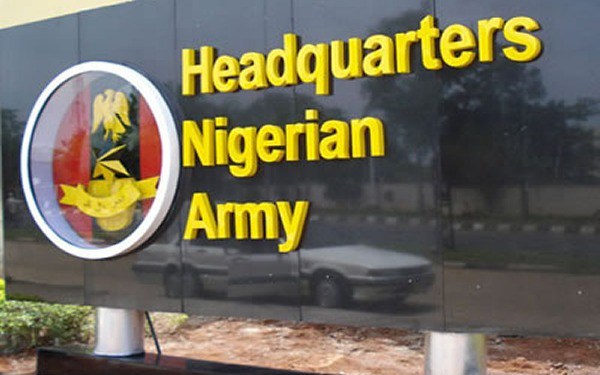Senate To Probe Buhari Govt, Emefiele Over N30tn Ways And Means Loans
The Nigerian Senate on Tuesday resolved to probe how the N30tn Ways and Means loans of the Central Bank of Nigeria was obtained and spent by the administration of former President Muhammadu Buhari.
Ways and Means is a loan facility through which the CBN finances the government’s budget shortfalls.
The senate stated that the reckless spending of the overdraft collected from the CBN under Godwin Emefiele largely accounted for the food and security crises the country was currently facing.
The senate then resolved to set up an ad hoc committee to investigate what the N30tn overdraft was spent on by the immediate past government, noting that the details of the spending were deliberately not made available to the National Assembly.
The ad-hoc committee which will be constituted on Wednesday (today) will also probe the N10tn expended on the Anchor Borrowers Scheme, the $2.4bn forex transaction out of the $7bn obligation made for that purpose as well as other intervention programmes.
The development came as biting food crisis, rising inflation, naira depreciation and worsening insecurity continue to take tolls on Nigerians.
President Bola Tinubu and his economic team have come under intense criticism after his last year’s fuel subsidy removal and exchange unification policy unleashed harsh economic conditions on citizens.
Tinubu’s cabinet members have continued to argue that the current crises were exacerbated by the gross mismanagement of the Buhari regime, arguing the current reforms were meant to right the wrongs of the past administration.
The latest move by the Senate is expected to unravel the ways the country and its resources was allegedly mismanaged by the Buhari administration.
Buhari had in a letter to the National Assembly in January 2023 requested that the N22.7trn Ways and Means loan should be converted to a 40-year bond with a moratorium of three years.
He also requested approval to borrow an additional N1trn to fund the N819.5 billion 2022 supplementary budget which the lawmakers approved last December.
Following the request, the House of Representatives on May 4, 2023, approved the conversion of the N23.7trn loan to a long-term bond for 40 years at the rate of nine per cent per annum.
The bond has a moratorium of three years.
The lower chamber approved the consideration of the report presented by the House Committees on Finance, Banking and Currency and Aids, Loans and Debt Management.
The Committee of Supply, chaired by the then Deputy Speaker Idris Wase, considered the recommendation in the report and approved it.
But the 9th Senate was thrown into a chaotic session after some lawmakers opposed Buhari’s request to approve the CBN loan as they demanded the details of his proposal.
The Chairman of the Senate Committee on Finance, Adeola Olamilekan, attempted to present the report of the president’s request when Rivers senator, Betty Apiafi, raised a Point of Order and said the president’s request was not constitutional.
She was, however, ruled out of order by the then Senate President, Ahmad Lawan, who asked that Olamilekan present the report before contributions are made.
Citing relevant laws from the Constitution, the CBN Act and the Senate Standing Rules, Rivers senator, George Sekibo, argued that the request was not in line with the Constitution.
‘’It will be a disservice that we have spent that money on behalf of Nigerians. It will be an abuse of our personal sense and against our privileges if we approve this request without details of the expenditure,’’ he insisted.
Many lawmakers who opposed the president’s request either said it was against the laws or wondered why the National Assembly was not notified when the amount was taken from the Central Bank.
However, the Senate’s resolutions on Tuesday followed the consideration of the report of its Joint Committee on Banking, Insurance and Other Financial Institutions, Finance, National Planning, Agriculture and Appropriation on State of the Economy after interactive sessions held with the Federal Government economic management team.
But the consideration of the report during the plenary was stormy with accusations and counter-accusations by Senators on how the N22.7tn Ways and Means was passed by the 9th Senate in May 2023.
The lawmakers were also miffed by the passage of N7.2tn on December 30, 2023, by the 10th Senate.
Specifically, the Whip of the Senate, Senator Ali Ndume (APC Borno South), in his contribution blamed the Senate for approving the request without details from former President Buhari.
Ndume said, “When the N22.7trn Ways and Means approval request was brought before the 9th Senate, I insisted that details of spending made with it should be provided before approval but the Senate then went ahead and approved it.”
However, the Deputy Senate President, Jibrin Barau, countered that the decision taken then was a collective one with the caveat that the executive should provide details later, which was however not provided.
In his defence, the former Senate President, Lawan, claimed that the Ways and Means was in the past and urged the Senate to focus on the present.
Lawan said, “All of that is in the past, we must focus on the present which is the fact that people are hungry and they are crying. That’s what we should focus on.”
The Senate President, Godswill Akpabio, said as recommended by the committee and supported by most of the Senators, a thorough probe must be carried out on the N22.7tn Ways and Means approved in May 2023 by the 9th Senate which later increased to N30trn, with the passage of the N7.2trn accrued interest forwarded to the senate for passage last December.
Akpabio said, “The food and security crises confronting the nation now are traceable to the way and manner the said Ways and Means were given collected and spent. Details of such spending must be submitted for required scrutiny and possible remedies because what Nigerians want is food on their table which must be given.”
He added, “Other recommendations made by the committee on the need for a thorough investigation of the N10trillion Anchor borrowers programme, and other intervention programmes running into billions of dollars must be investigated.
“But as rightly recommended by the joint committee, security agencies should, as a matter of national urgency, combat all forms of insecurity across the country for farmers to access their farms for required food production highly needed in the country now.”
According to the executive summary of the report by the Senate’s joint committee, a copy of which was obtained by one of our correspondents on Tuesday, the Nigerian economy is currently facing challenging times “largely caused by distortions resulting from major fiscal and monetary policy actions of previous governments notably the huge direct lending to the Federal Government by the Central Bank of Nigeria to the tune of about N30 trillion, the operation of an opaque fuel subsidy regime and a raft of interventions by the Central Bank which seemed not well targeted.”
The report stated that this had led rising inflation especially food, and persistent naira depreciation.
In reaction to the current economic hardships being faced by Nigerians, the Joint Senate Committee on Banking, Insurance and other financial Institutions, Finance, National Planning, Agriculture and Appropriation, had held an interactive session with the key members of the Federal Government’s economic management team.
The aim was to ascertain the true state of affairs of the country’s economy, the nature of the challenges and measures being put in place to address them within the shortest possible time.
According to the report, what has emerged from the interaction is the urgent need to bring down inflation, boost food production and stabilise the economy through proper coordination of fiscal and monetary policies.
The report further read, “The current state of the country’s economy is very challenging and has resulted in widespread suffering for the average Nigerian across the country. At the forefront of Nigeria’s economic challenges is the alarming surge in inflation rates, with headline inflation soaring to a staggering 28.92 per cent as of December 2023. This inflationary pressure is more evident in the essential sector of food, with food inflation now as high as 33.93 per cent leading to cost-of-living crisis and rendering basic necessities increasingly unaffordable for many Nigerians. The inflationary spiral not only erodes the purchasing power of households but also exacerbates poverty and inequality across the nation.
“One of the main drivers of inflation in Nigeria today is the volume of money in circulation. As at December 2023, the country recorded an unprecedented money supply of N78.74tn, and a 51 per cent year-on-year increase when compared to money supply as at December 2022. One of the driving forces of this significant increase in money supply was the N30tn Ways and Means or the direct financing extended by the CBN to the Federal Government which has only weakened the balance sheet of the central bank. In addition to the inflationary pressures, the country is also battling with acute shortages of food items.”
The report noted that the naira has continued to weaken against the dollar overtime, adding that “In January 2024, the naira depreciated against the dollar by 37.6 per cent which has contributed to the inflationary pressures in the country, increased the cost of goods and services and also led to increased foreign exchange speculation.”





